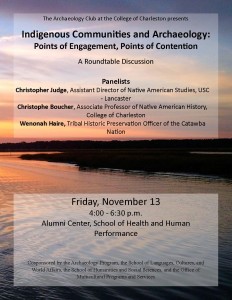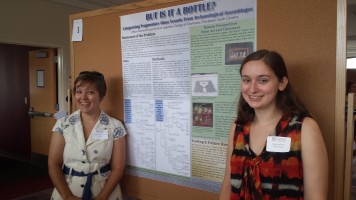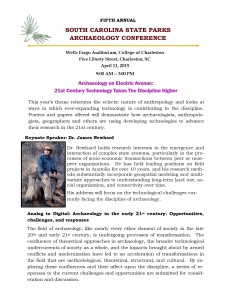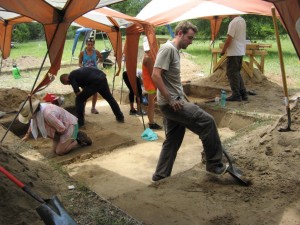Archives For November 30, 1999
For those interested in getting some archaeological experience and being a member of the research team at Dixie Plantation, Dr. Maureen Hays will be offering ANTH493 Field School in Archaeology (4 credits) in Maymester this year (May 16th to May 31st).
This course fulfills the Anthropology major Research Methods requirement and the Capstone requirement for the Archaeology major/minor.
ANTH202 is the prerequisite (or permission of Instructor). If you have taken ANTH202 students will be able to sign up for the course when summer registration opens. If students have not taken ANTH202 but really want to learn something about archaeology, send Dr. Hays an email requesting permission.
The property is owned by the College of Charleston Foundation and located in Hollywood, SC (about 40 minutes from downtown Charleston). Dixie Plantation has a long occupational history (both historic and prehistoric). Focus this summer will be on the early colonial occupation of the site (1700-1750).
The project is co-directed by Dr. Maureen Hays (College of Charleston) and Dr. Kim Pyszka (Auburn University at Montgomery).
For more detail, please see attached.
The Archae ology Club, as a part of Native American History Month, is sponsoring a roundtable discussion on Friday, November 13 from 4:00 to 6:30 in the Alumni Center of the School of Education, Health, and Human Performance.
ology Club, as a part of Native American History Month, is sponsoring a roundtable discussion on Friday, November 13 from 4:00 to 6:30 in the Alumni Center of the School of Education, Health, and Human Performance.
“Indigenous Communities and Archaeology: Points of Engagement, Points of Contention”
Panelists:
Christopher Judge: University of South Carolina – Lancaster
Christophe Boucher: College of Charleston
Wenonah Haire: Catawba Nation
Cosponsored by the Archaeology Program; the School of Languages, Cultures, and World Affairs; The School of Humanities and Social Sciences; and the Office of Multicultural Programs and Services.
 How do archaeologists identify the fragmentary shards of glass found in excavations as bottles, plates, and cups? Archaeologists at the College of Charleston can tell you. Sarah Legendre and Dr. Allison Sterrett-Krause presented preliminary findings of their work conducted over the summer in the annual celebration of summer research at the College of Charleston. Their study applied stepped regression analysis to develop a typological hierarchy, useful for identifying the functional type of most glass fragments found in Mediterranean contexts. The quantitative approach aids a field in which previous studies had used more empirical categories, not always informed by statistical methods.
How do archaeologists identify the fragmentary shards of glass found in excavations as bottles, plates, and cups? Archaeologists at the College of Charleston can tell you. Sarah Legendre and Dr. Allison Sterrett-Krause presented preliminary findings of their work conducted over the summer in the annual celebration of summer research at the College of Charleston. Their study applied stepped regression analysis to develop a typological hierarchy, useful for identifying the functional type of most glass fragments found in Mediterranean contexts. The quantitative approach aids a field in which previous studies had used more empirical categories, not always informed by statistical methods.
Their work, funded by the Office of Undergraduate Research and Creative Activities, the Department of Classics, and the Yawkey Foundation and conducted at the Center for Social Science Research (CofC), will be formally presented at the upcoming 20th Congrès de l’Association Internationale pour l’Histoire du Verre in Fribourg, Switzerland.
CofC archaeologists assist with fossil whale recovery in Dorchester County. http://tinyurl.com/ptqv22u
 The Marine Research Division of the South Carolina Institute of Archaeology and Anthropology (SCIAA-MRD) is offering 3 internships for the fall 2105 semester:
The Marine Research Division of the South Carolina Institute of Archaeology and Anthropology (SCIAA-MRD) is offering 3 internships for the fall 2105 semester:
1. Archaeological Collections, involved with doucmenting the archaeological teaching collection
2. Database and Digital Documentation, assisting in the development of a database and digitization of documents from over 40 years of dive records.
3. Social Media/Public History, assisting in the development of the MRD’s social media platform.
Please send cover letter, CV, and a list of 3 references to Jessica Irin at irwinJA@sc.edu. Course credit can be arranged via the Department of Sociology and Anthropology. Contact Dr. Qirko at qirkoh@cofc.edu. See the attached flyer: MRD_2015_Internships_annoucment.
This summer’s field school collected data from several contexts within the Lowcountry. Investigations included soundings at Rose and Hampton Plantations, and historic properties in the urban core of Charleston. See the report from Martha Zierden at the Charleston Museum blog post for more details.
This story is reproduced from its original posting on the Dept. of Sociology and Anthropology blog .
The first two weeks of the archaeology field school were spent working at the site of the Rose Plantation, which is a part of a 600 acre property called the Dill Property on James Island owned by the Charleston Museum. We were working in an area where old maps showed structures that were probably part of this plantation. We found remains of some structures and many artifacts that seem to suggest that we found some of it.
Weeks 3-6 were spent mostly at Hampton Plantation State Historic Site north of Charleston near McClellanville, SC. The field school has worked on this site before but not in this location which was in a large field south of the main plantation house. Our most productive excavation units were located at the southern end of this field, and a considerable distance from the plantation house. These excavations were overseen by David Jones, who coordinates the archaeological program for the State Park Service to include research archaeology and protection of archaeological resources. He was assisted by Stacy Young, who is an archaeologist contracted in the past to excavate part of the old slave residential area at this plantation.
During this period students also rotated through two sites in downtown Charleston to get a feel for urban archaeology, which produces a very different set of challenges. One site was at 86 Church Street, owned by the parents of archaeologist, Martha Middleton. It ended up being a 4 1/2 foot deep single excavation unit with a lot going on in it. The second site was the historic Manigault House, owned by and located across from the Charleston Museum. Excavations were done both in the basement and under the porch.
Historic artifacts were found in all these locations, but lab analysis will be required to determine what it all means. At Hampton Plantation not enough colonoware (pottery commonly made by African slaves, and possibly also Native Americans) was found to suggest that the structure(s) we think we uncovered were those of Africans. There was also no window glass that is usually found in European-style structures. The Seewee Indians were also residents in the area during the colonial period, and our Hampton site may have something to do with them. Lab analysis and, hopefully, more field school research there in two years will be necessary to sort this out.
Students read 21 professional articles on various phases of archaeology, learned to identify about 80 kinds of historic ceramics used for dating purposes, and did additional written work in addition to learning fieldwork skills.
For photos of the 2015 Archaeology Field School, please check out the CofC Sociology and Anthropology Facebook page.
 This year’s conference (April 11, 9:00 -3:00; Wells Fargo Auditorium, College of Charleston) will include papers highlighting recent research in the history, archaeology, and societies of the Lowcountry of South Carolina. Many studies reflect the overall theme of the conference, which takes a particular interest into the uses of technology in the study and presentation of the past. Participants include:
This year’s conference (April 11, 9:00 -3:00; Wells Fargo Auditorium, College of Charleston) will include papers highlighting recent research in the history, archaeology, and societies of the Lowcountry of South Carolina. Many studies reflect the overall theme of the conference, which takes a particular interest into the uses of technology in the study and presentation of the past. Participants include:
Olivia Adams: “Examining Cultural Landscapes of the Past: Charles Towne Landing”
Zak Bartholomew: ‘The Use of Geospatial Statistics for Defining Archaeological Sites Using Surface Survey Data”
Caitlin Bennett: “Dental Age Estimation in Subadults: A Re-Evaluation of Standards for Contemporary African American Children”
Carolyn Howle: “Reimagining the New Grange Passage Tomb through Folklore”
Jeremy C. Miller & Aaron Brummitt: “Observing Multi-Site Occupation through Innovative and Affordable Technologies: An Analysis of over 5,000 Years of Human Occupation at 38BK2091, Rebellion Farms”
Hannah Rawcliffe: “Anthropology and Technology: How Can Cultural Heritage Digitization Improve Dissemination of Information to the Public?”
Susan Bergeron: “Reconstructing the Rice Kingdom: Developing an Immersive Virtual Landscape for Historic Hampton Plantation”
Jesse Rouse: “From the Surface Down: Looking for Landscape Change at Hampton Plantation”
Craig Garrison: “Carriage Steps and Charleston’s Streetscape”
Welcoming Remarks by Tracey Burkett, Interim Chair of the Department of Sociology and Anthropology, College of Charleston
Keynote Address by James Newhard, Director of Archaeology, College of Charleston
The conference is sponsored by the SC State Park Service in partnership with the Department of Sociology and Anthropology and the Program in Archaeology at the College of Charleston.
Just out – an edited volume by Bill Caraher on 3D applications in archaeology, Visions of Substance. The contributions began as a series of blogposts entitled “3D Thursday“. Expanded and edited, the volume is available now for free download, with availability on Amazon by the end of the month.
Congratulations to the following archaeology students and faculty mentors, who have received support for research and professional presentations from the College’s Office of Undergraduate Research and Creative Activities:
Academic Year Research Award
Alana Acuff (Anthropology) and Jami Baxley (Classics)
Mentor: James Newhard
Title: The Global Electronic Repository of Aegean Scripts (GERAS): post-processing 3D structured light scanning imagery
Research Presentation Grants
Olivia Adams (Anthropology)
Mentors: Maureen Hays, Kimberly Pyszka
Title: Landscape Archaeology and GIS: Understanding Cultural Adaptations and Tenant Farming in the Low Country, Hollywood, SC
Conference: South Eastern Archaeological Conference
Zak Bartholomew (Anthropology)
Mentor: James Newhard, Norman Levine
Title: The Development of a Legacy GIS for the Contextualization of the Linear B Deposits from the Palace of Nestor at Pylos
Conference: Archaeological Institute of America Annual Meeting





